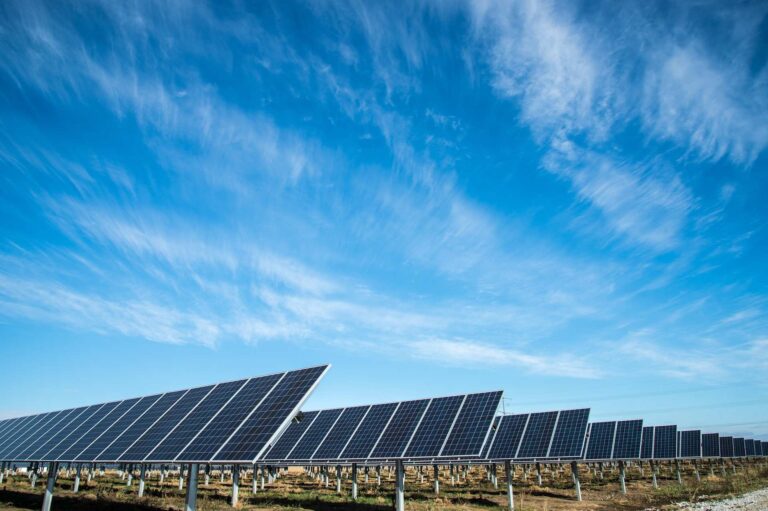Morocco could become a key energy hub for Europe, capable of satisfying, for example, 8% of Great Britain’s needs and 4% of those of Germany and Italy.
This is the scenario outlined in an in-depth article by the BBC describing the efforts of Rabat’s public and private sectors to increase renewable energy production. This, in a country that already has the world’s largest solar park.
Table of Contents
An extraordinary potential
If there is one person who is convinced that Morocco can become an energy hub for Europe, it is Moundir Zniber. Zniber is an entrepreneur who has been active in the field of renewables for fifteen years with his company Gaia Energy.
“The resources we have here,’ Zniber told the BBC, ‘could be one of the great answers to European demand. (…) I think Morocco represents the best opportunity for the European continent to emancipate itself from its dependence on Russian gas. (…) Morocco really has some of the best solar and wind resources in the world. We have no oil, we have no natural gas, but we have a potential that is simply extraordinary”.
Morocco’s plan for renewables
The Moroccan government has the ambition to generate 52 per cent of its electricity from renewable sources by 2030. With the aim of exporting it to Europe via submarine cables.
But the North African country will have a lot of work to do before reaching this goal. Thus considering that today it still depends on imports for 92% of its energy needs. Much of which is still met through fossil fuels.
In 2012, only 12.4% of Morocco’s electricity production was based on wind power and 4.4% on solar power. Nothing compared to the 80.5% share derived from the coal, gas, oil triad.
Yet the country is making giant strides in renewable energy generation. This, thanks to projects such as the colossal Noor-Ouarzazate complex. Which has been in operation since 2016 and is the largest solar panel park in the world.
Will Morocco meet part of the European demand?
The aforementioned Zniber is of the opinion that Moroccan private companies such as his Gaia Energy must now commit to exporting solar and wind energy as well as green hydrogen to Europe.
Gaia Energy’s goal in particular is to develop projects that can lead to production to meet up to 4 per cent of the electricity needs of Germany and Italy. The company’s plans on green hydrogen are even more ambitious because they aim to meet 25% of European demand.
In order to support Morocco’s projects, the World Bank has earmarked funds amounting to several million dollars. Also with the aim of reducing, as Moez Cherif, an economist at the Washington Institute, puts it, ‘the strong volatility of fossil fuel prices’.
According to Cherif himself, the development of this sector will bring beneficial effects to an economy like Morocco’s plagued by an unemployment rate of 11.2 per cent. Thus by creating around 28,000 jobs a year.
Morocco’s green transition
According to the economist, the green transition underway in Morocco will also allow the country “to position itself as an industrial hub for investments in green industrial exports”. Particularly, in the energy-intensive automotive industry.
Private investments will also play their part. One example is that of the British energy startup Xlinks. Whose project to build an underwater electricity cable linking Morocco to Great Britain aims to ensure that by 2030, 8% of London’s electricity demand will be met by Moroccan solar and wind power.
Other European countries have also shown concrete interest in the opportunities provided by Morocco. For example, in the context of the COP27 in Sharm el-Sheikh last November, Rabat signed a Memorandum of Understanding with the governments of Berlin, Paris and Lisbon. With the aim of speeding up and facilitating the cross-border transport of energy.
Read also: Renewables, why is wind power the energy of the future
The government’s objectives
Interviewed by the BBC, Moroccan Minister for Energy Transition and Sustainable Development Leila Benali is forced to admit the delays encountered by her country’s projects in the development of the renewables sector.
Delays that she attributes to adverse global factors. Such as the pandemic and the dislocation of production and value chains ‘which have affected’, says the minister, ‘renewable energy’.
Rabat nevertheless aims, the minister emphasises, to do its part to ensure that there is a change of pace as soon as possible. Among the actions that will be put in place will be a drastic cut in bureaucracy. This will, for example, speed up the purchase of property on which to install panels and turbines.
In particular, the executive’s strategy hinges on three pillars. Firstly, increasing the production of renewables. Secondly, improving production efficiency. And lastly, pursuing integration into international energy markets.
Internal or external: Morocco’s dilemma
For a country that still imports the vast majority of its energy from abroad, this external projection may seem unrealistic. Many believe that the real priority is first and foremost to satisfy demand from the domestic market.
Benali shares this view, emphasising that her government will strive to ensure that all Moroccans have access to energy verse ‘at the lowest possible cost’ as soon as possible.
However, the minister is at the same time aware of the ‘historic opportunity’ to integrate Morocco into the European energy market. It is by pursuing this path, emphasises Benali, that it will be possible, for example, to attract the international investment needed to make the Moroccan renewables sector reach its ideal size.
World Bank economist Cherif is convinced that there is no such thing as an ‘aut aut aut’. ‘Ideally, one should do both,’ he notes, referring to increased production for domestic consumption and increased production for export.
Read also: Will the North Sea become the world’s leading wind power hub?












